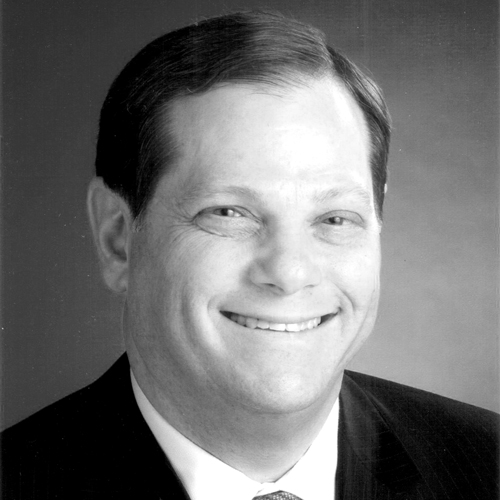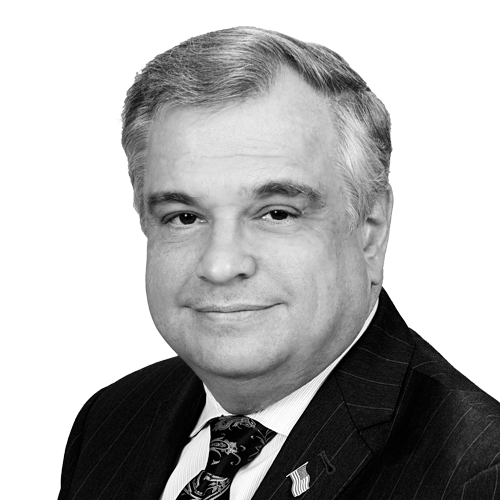
In the early 1960s, Paul Stewart’s mother was quite ill. Ailing from rheumatic fever and cardiac problems, she was one of the first individuals in the United States to undergo open-heart surgery. The medical team replaced a damaged valve, a then-novel procedure that added years to her life and left a lasting impression on her son. “That, more than anything, piqued my interest in healthcare,” Stewart says. “I knew that I wanted to be of service, help others, and make a difference in the world.”
$1.5 million in charitable giving
For the past 23 years, Stewart has been living out that dream as CEO of Sky Lakes Medical Center, an integrated-care system composed of a 176-bed medical and surgical hospital in Klamath Falls, Oregon, 15 satellite clinics, and a full-service cancer treatment center. Sky Lakes’ service arm casts an unusually wide net, encompassing everything from nursing- and family-residency training programs (run jointly with Oregon Health & Sciences University) to $1.5 million in 2015 contributions to the city of Klamath Falls. These funds support park and swimming-pool capital projects, school programs, and even the purchase of an 18-acre parcel that will become the Klamath Works Human Services Campus, providing residents in need a one-stop shop for social-service support, alcohol and drug treatment, workforce training, and mental-health services.
Why is Stewart so intent on investing in green infrastructure projects and community programs beyond Sky Lakes’ walls? In a word: prevention. “We believe if we get people out of welfare, eating better, planning their pregnancies, and making healthier lifestyle choices, there is a major cost benefit,” he says. “It may seem nontraditional, but we are very committed to a holistic approach to making the community healthy.”
80,000 people served in one of least healthy US regions
That upstream approach may be especially potent among the population that Sky Lakes serves: approximately 80,000 people living in 10,000 square miles in south-central Oregon (most of Klamath and Lake counties) and northeastern California (the majority of Modoc and Siskiyou counties), a number of them unemployed and living in poverty.
Several years ago, a nationwide health-rankings study, conducted by the University of Wisconsin Population Health Institute, identified Klamath County as one of the least healthy communities in the country. Rankings were based not only on clinical care, Stewart says, but behavioral, social, and environmental factors associated with increased health risk—things like poverty, obesity, smoking, and access to healthy food.
“We believe if we get people out of welfare, eating better, planning their pregnancies, and making healthier lifestyle choices, there is a major cost benefit,” Stewart Says. “It may seem nontraditional, but we are very committed to a holistic approach to making the community healthy.”
The Power 9
Concerned by these results, Stewart led Sky Lakes in creating the Healthy Klamath Initiative, a grassroots coalition of local not-for-profits, community groups, and business partners focused on ways to make the community healthier. The project aligned with the Oregon Healthiest State initiative and, eventually, sparked conversation about making Klamath Falls a Blue Zone.
Led by Dan Buettner, National Geographic, and a team of longevity experts, the Blue Zones project was conceived in 2004 as an attempt to identify regions of the world where people live the longest. In these Blue Zones (areas like Ikaria, Greece, and Okinawa, Japan), the researchers found people reach age 100 at rates 10 times greater than in the United States. They identified nine common lifestyle characteristics—the so-called Power 9—shared by the longest-living cultures. The first is to move naturally—gardening, for instance—rather than exercising at the gym or running marathons. Another is to drink one to two glasses of wine per day, while another is to be part of a faith community.
To help Klamath Falls join a growing group of US cities and regions applying the Power 9 to increase longevity within their communities, Sky Lakes provided a $600,000 gift, applied over three years, which will be leveraged by an additional $1.2 million from the Cambia Health Foundation. Klamath Falls officially became a Blue Zone this past July.
Zero harm
However, Sky Lakes’ endeavors to improve community health are not merely philanthropic, Stewart insists; there are real health outcomes and cost savings at stake. Internally, Sky Lakes is pursuing a “zero harm” initiative to eliminate practice errors that cause harm: wrong drug dosages, mistimed medication delivery, infections resulting from contaminated surgical equipment. “A nuclear submarine is a highly reliable system. So is an airplane, if you think of the record of the airline industry. Healthcare hasn’t gotten there yet, but that should be our first goal: zero harm,” Stewart says.
To help achieve this goal, the electronic health record system Epic will give physicians access to a patient’s current health record in a single search. The system, which went live in Sky Lakes Medical Center on August 1, 2015, is helping practitioners respond more quickly to patients and assign prescriptions based on a complete clinical history.
42,000 employees insured
Stewart is also working with the CEOs of six area hospitals, an insurance provider, and the firm Evolent Technology to create a data warehouse to analyze medical and claims records for 42,000 healthcare employees. The initiative, known as Propel Health (and previously known as the Population Health Alliance), aims to identify gaps in care and to improve screening and treatment through shared knowledge and resources. By shifting the financial risk from insurance companies to the providers themselves, Stewart says, this “population health” approach can shave the premiums for employees by up to 15 percent.
Coming full circle
The social impact that Stewart has imparted has been a long time coming from where he started out originally—as a pre-med student at Utah State University. Initially, he wanted to be a radiologist; however, something wasn’t quite right about the vision of himself inside a dark room poring over X-rays. He realized his true calling was in management and, following graduation, shifted his focus, pursuing a graduate degree in health-services administration at Arizona State University.
“There’s a Harvard professor who says management is the most noble of professions because, if you do it right, you can help the most people learn, achieve, and succeed,” Stewart says. “People are at the center of everything you do.” Today, as Sky Lakes’ CEO, Stewart truly embodies that people-first vision of leadership.


